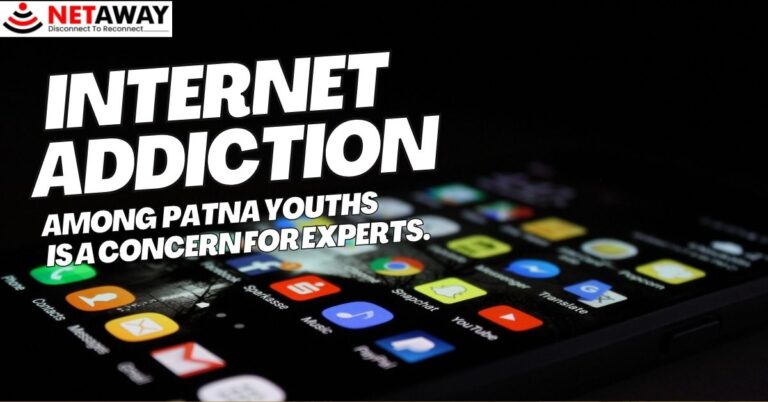
The increasing use of the internet among youths in Patna is a cause for concern for experts. A recent study by the Indian Council of Medical Research (ICMR) found that nearly 20% of adolescents in Patna are addicted to the internet. This addiction can have serious physical and mental health consequences.
As technology continues to evolve and penetrate various aspects of our lives, experts have expressed their worries about the detrimental effects of excessive internet usage. In this article, we delve into the specific challenges faced by Patna’s youths and seek insights from experts to shed light on the magnitude of the issue.
I. The Digital Landscape of Patna
Patna, the capital city of Bihar in India, has experienced a significant digital transformation in recent years. Increased internet penetration, widespread smartphone availability, and access to affordable data plans have contributed to the pervasive use of the internet among the city’s youths. Social media platforms, online gaming, streaming services, and instant messaging have become integral parts of their daily lives, shaping their communication patterns and leisure activities.
II. Understanding Internet Addiction
Internet addiction refers to a compulsive and excessive use of the internet, leading to adverse effects on various aspects of an individual’s life. In Patna, as in other parts of the world, experts have noted the emergence of internet addiction as a concerning issue among the youth population. This addiction can lead to social isolation, academic decline, mental health problems, and disrupted personal relationships.
III. Factors Contributing to Internet Addiction in Patna
A. Digital Divide: While Patna has witnessed significant advancements in terms of digital infrastructure, there remains a digital divide, particularly among underserved communities. Unequal access to reliable internet services may lead to a higher dependency on the internet when available, exacerbating the risk of addiction.
B. Social Media Influence: The allure of social media platforms has a profound impact on the youth of Patna. The need for social validation, fear of missing out (FOMO), and constant exposure to curated online personas can contribute to excessive internet use and addictive behaviors.
C. Escapism and Entertainment: Online gaming, video streaming platforms, and other forms of online entertainment provide an escape from reality for many Patna youths. The immersive nature of these activities can lead to an unhealthy reliance on the internet, as it offers a temporary respite from everyday challenges.
IV. Expert Perspectives on Addressing Internet Addiction
Experts in the field of mental health and addiction emphasize the importance of awareness, education, and support systems to tackle internet addiction among Patna youths. They suggest the following strategies:
– Promoting digital literacy and responsible internet use through educational programs and workshops.
– Encouraging offline activities and hobbies to reduce excessive screen time.
– Establishing support groups or counseling services specifically targeted at addressing internet addiction.
– Encouraging open communication between parents, educators, and youths about the risks and consequences of internet addiction.
Conclusion
Internet addiction among Patna youths is a pressing concern that demands attention from various stakeholders. By understanding the contributing factors, consequences, and expert perspectives, we can work towards creating a healthier digital environment. Through a collective effort involving parents, educators, policymakers, and the community, we can foster responsible internet usage and provide necessary support systems to address internet addiction effectively. It is crucial to empower Patna’s youths with the knowledge and tools to navigate the digital world safely and strike a balance between online and offline activities for their overall well-being.
FAQs
What are 3 bad things about internet ?
1. Privacy concerns: Data breaches and surveillance jeopardize personal information.
2. Cybersecurity threats: Malware, phishing, and hacking pose risks to users and organizations.
3. Spread of misinformation: False content can rapidly propagate, misleading users and undermining trust in reliable sources.
What is the abuse of internet in the society?
The abuse of the internet in society manifests through various negative aspects. Cyberbullying leads to emotional distress; online scams exploit innocent individuals financially. Social media addiction impacts mental health, while misinformation spreads rapidly, eroding trust in credible sources. Additionally, excessive screen time hampers physical well-being, posing significant challenges to modern society.
Is internet useful or harmful?
The internet is a powerful tool with both positive and negative impacts. Its usefulness lies in global connectivity, information access, and communication. However, its potential harm includes privacy concerns, cyber threats, and misinformation. Responsible usage and cybersecurity awareness are vital to maximize the internet’s benefits while mitigating its drawbacks.
What is the bad impact of internet on modern children?
The internet has concerning effects on modern children. Excessive screen time leads to sedentary behavior and health issues. Cyberbullying causes emotional distress, impacting mental well-being. Exposure to inappropriate content risks their innocence. Social media addiction affects social skills and self-esteem. Parents must monitor and guide their online activities to mitigate these harmful impacts.
Why is internet safety is important?
Internet safety is crucial due to the rising cyber threats and online risks. Protecting personal information, avoiding scams, and preventing cyberbullying are essential to safeguard privacy and maintain a secure online environment. Staying vigilant against phishing, malware, and identity theft ensures a safer digital experience for all users.
